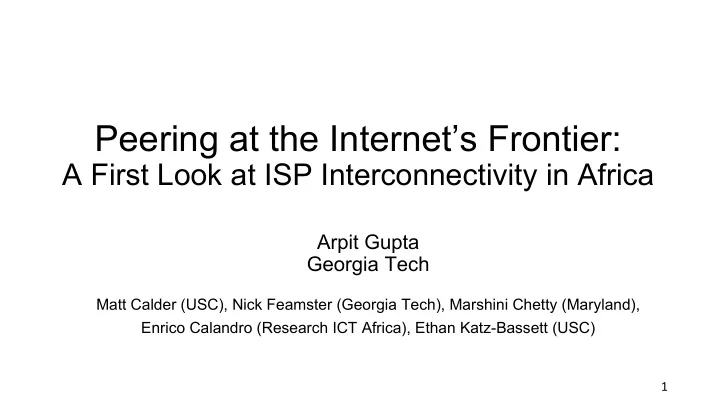

Peering at the Internet’s Frontier: A First Look at ISP Interconnectivity in Africa Arpit Gupta Georgia Tech Matt Calder (USC), Nick Feamster (Georgia Tech), Marshini Chetty (Maryland), Enrico Calandro (Research ICT Africa), Ethan Katz-Bassett (USC) 1
Broadband Connectivity in Africa According to ITU in 2013 93 million broadband • subscriptions 27% growth in past 4 years • ( Highest ) Broadband associated with • economic growth + development Yet, very little is known about performance in Africa and what causes poor performance when it does arise. 2
How Well Does Broadband Perform? 3
Latencies to Nearby Locations are High Latencies from South Africa to Kenya, Brazil, India are 2x higher than latencies to Europe. 500 Latencies (ms) 300 Europe Kenya Brazil India 100 4
Latencies are Even Higher During Failures • March 27, 2013 0620 UTC: SWM4 Fiber Cut • All BISmark hosts could not reach KENet for 3+ hours • Latencies remain high for another 8+ hours (except for Neotel, in South Africa) More details: http://connectionmanagement.org Latencies remain high from Europe and North America. Only one AS in S. Africa, Neotel sees decent latency after 3 hours. 5
Causes of High Latency: Circuitous Routing Paths LINX (London 9000 km 7000 km Europe/ US Africa Kenya South Africa 6 3000 km
Two Questions • What is the nature of Internet interconnectivity (between ISPs) in Africa? • What can be done to reduce latency to common Internet services? 7
Two Questions • What is the nature of Internet interconnectivity (between ISPs) in Africa? • What can be done to reduce latency to common Internet services? 8
BISmark: Measurements from Fixed Locations Example: Cape Town Users 175+ Active Routers, 20+ countries • Users install routers in home networks • Custom firmware performs periodic measurements • Can aggregate by country, city, ISP 9
BISmark Deployment in South Africa • Periodic latency and throughput measurements • Traceroutes to explain the cause of path performance • Router-based deployment • 17 home networks, 7 ISPs, all 9 provinces 10
Destinations for Traceroute Probes Global M-Lab Servers Google Caches in Africa 11
High Latencies to Nearby Locations… Cape Town (SA) to M-Lab Cape Town (SA) to Johannesburg (SA) M-Lab Nairobi (KE) … … 7, 196.44.0.74, 7.793, South Africa, AS16637 8, 209.212.111.201, 199.446, South Africa, AS16637 8, 196.223.22.24, 8.338, South Africa, Cape Town IXP 9, 195.66.225.31, 217.301, United Kingdom, London IXP (LINX) 9, 41.164.0.243, 34.679, South Africa, AS36937 10, 196.32.209.77, 201.569, South Africa, AS36944 … … 14, 196.24.45.146, 92.511 , South Africa, AS2018 14, 197.136.0.108, 368.107 , Kenya, AS36914 High Latency 12
… Circuitous Routing Paths Cape Town (SA) to M-Lab Cape Town (SA) to Johannesburg (SA) M-Lab Nairobi (KE) … … 7, 196.44.0.74, 7.793, South Africa, AS16637 8, 209.212.111.201, 199.446, South Africa, AS16637 8, 196.223.22.24, 8.338, South Africa, Cape Town IXP 9, 195.66.225.31, 217.301, United Kingdom, London IXP (LINX) 9, 41.164.0.243, 34.679, South Africa, AS36937 10, 196.32.209.77, 201.569, Kenya, AS36944 … … 14, 196.24.45.146, 92.511 , South Africa, AS2018 14, 197.136.0.108, 368.107 , Kenya, AS36914 Packets leaving Africa 13
Poor ISP Interconnectivity in Africa •Reasons • Local ISPs not present at regional IXPs • IXP participants don ’ t peer with each other •Consequences • Local traffic does not stay local • Paths leave continent 14
Local ISPs not Present at Regional IXPs •ISPs prioritize connecting to European IXPs •Lesser incentives to connect at regional ones KENET South Africa Kenya Liquid Telecom KIXP JINX (Nairobi) (Johannesburg) 15
Missing Peering Links at Regional IXPs •Most content not available locally •Less incentive to peer with local ISPs South Africa Kenya KENET MTN, SA MTN, KE IS, SA IS, KE KIXP JINX (Nairobi) (Johannesburg) 16
Regional IXPs Only Prevalent on Intra-Country Paths Within South Africa: Between South Africa and Kenya: Few Paths have Regional IXPs High Fraction of Paths Have at Least one Major Regional IXP BISmark Routers BISmark Routers (Fraction) (Fraction) JINX (SA) is most prevalent LINX (UK) is most prevalent IXP Prevalence (Normalized) IXP Prevalence (Normalized) 17 M-Lab Johannesburg M-Lab Nairobi
Two Questions • What is the nature of Internet interconnectivity (between ISPs) in Africa? • What can be done to reduce latency to common Internet services? 18
Solution #1: Add More Caches •Traceroute Probes between BISmark routers (eyeball) and Google Cache Node in Uganda (content) •Google cache hosted by MTN •Emulates scenario where content is in nearby country Latency Improvements Latency improvements are limited Inside Customer Cone when peering to the cache is not adequate. BISmark Routers 19
Solution #2: Add More Peering Links • Simulation : Add peering links between all the participants at •JINX (Johannesburg) •KIXP (Nairobi) •Emulates scenario where more ISPs Δ ~ 250ms connect and peer at regional IXPs Latency Improvements Additional peering links à Significant latency improvements 20
Better Peering is a Substitute for Additional Caches • Experiment: • add caches in Kenya Existing Links • traceroute Probe from SA • Two scenarios • Use existing peering links • Add more peering links Additional caches have little effect Additional Links on average latency (compared to adding more peering links). 21
Summary • What is the nature of Internet interconnectivity (between ISPs) in Africa? • Many ISPs are not present in regional IXPs • Many ISPs do not interconnect at regional IXPs • What can be done to reduce latency to common Internet services? • Peering at regional IXPs can reduce median intra-continent latencies by 250ms • Next steps: Better incentives for interconnectivity Arpit Gupta agupta80@gatech.edu 22
Backup Slides 23
High Latency Paths within Africa Geographical Distance • Normalized Latency: • Ratio of observed and speed of light propagation latencies • Darker blocks imply higher latency penalties • High Penalties for routes to M-Lab server in Nairobi High Normalized Latency 24 24 M-Lab Servers
IXP Prevalence •Quantifies presence of IXPs for routing paths •Similar to routing path prevalence •Lower IXP prevalence observed for circuitous routing paths 25
Recommend
More recommend